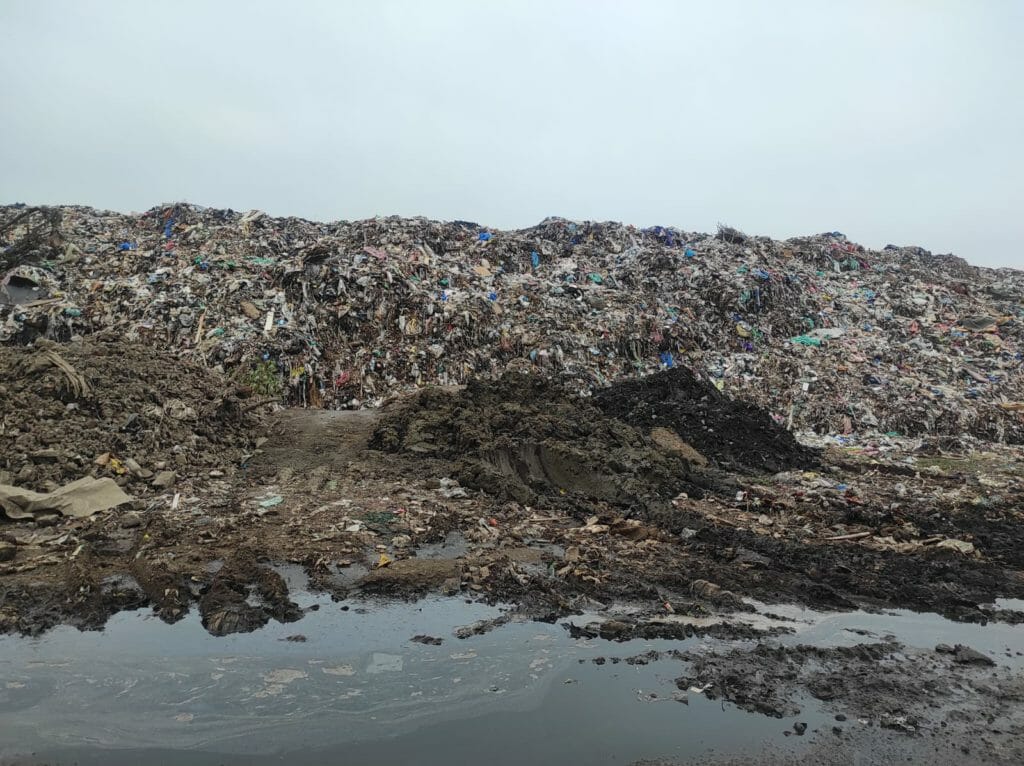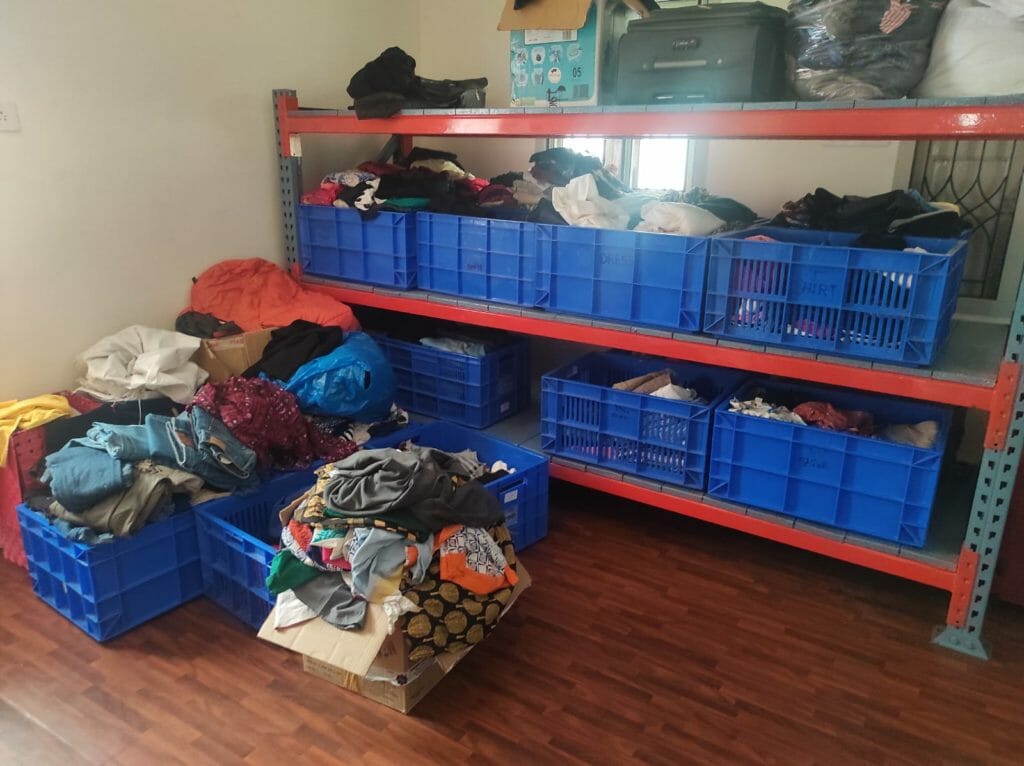A little girl came to the Thuli store looking for a bottle-green top to wear at the annual day function of her school. She found exactly what she was looking for in a matter of minutes, and free of cost. More importantly, she was able to save preowned clothing which would otherwise have found its way to a landfill.
Every year, the fashion industries of the world produce 53 million tonnes of fibres, and less than 1% of it goes back to use, with more than 70% of fibres dumped in a landfill or incinerated.
“Apart from filling up landfills, the chemicals from the dye or material can leach into the ground, polluting groundwater too,” says Afroz Khan, a researcher of urban governance with Citizen consumer and civic Action Group (CAG).
Aware of the environmental dangers of fast fashion and overconsumption, many people in Chennai are making an effort to transfer their used garments back into the economy in various ways.
“Thrifting or reusing used clothes is not just good for the environment but also helps people who cannot afford to buy clothes access,” says Abi, who works with Wasted 360, a waste management service in T. Nagar.
Changing consumption patterns see used clothes in landfills
“Generally, we have always had a culture of reuse. Families passed on used clothes, toys and other goods from elder siblings to younger siblings,” says Afroz, recalling the practice of sustainability within families in the city.
“Before, people hardly bought clothes, except during Diwali or Pongal. Passing on gently used clothes among known members was very common,” says Isai Prakash, who runs Second Chance, a collective which has distributed used garments to the deprived in Chennai, along with his friends.
“However, people reused clothes because there were no economic means to go on a buying spree. Today, people can afford clothes all the time,” says Afroz. “New garments are available from Rs 100, thanks to mass production, fast fashion and e-commerce platforms. It is not surprising to see people exceeding their wardrobe volume.”
Manikandan, the owner of Recycle Mart, illustrates how clothes end up in a landfill. “You have had some clothes before. Then you keep on accumulating new clothes over the years, forgetting about what was bought before. Later on, you may feel like the older clothes are not wearable. You will throw them away or give them to someone in need. The latter will take what they need and may also throw the rest, which ultimately ends up in the landfill.”
Read more: Managing waste in Chennai: The way ahead
Giving used clothes a new lease of life in Chennai
Despite many throwing away used clothes, there are people who take conscious efforts to do their bit for the environment.
P Jayanthi, a resident of Thiruvanmiyur and waste management aficionado, shares how she transfers used clothes to other streams. “Currently, I have three pieces of garments, which I have put aside. When it piles up, I will give them away. Previously, I gave off a bag of clothes a year and a half ago.”
“Before giving the used clothes to waste collection drives, I see if there are people in my vicinity who can wear these. For instance, after my in-laws expired, I gave away most of the clothes from their place,” she says.
If there are no takers, she hands over the old clothes to the waste drives conducted by waste management organisations like Goonj or Wasted 360. They connect with NGOs and supply these clothes to the deprived.
“People like Ladoo bhai exist on your streets, collecting used clothes in Chennai. Sometimes, there will be people hawking on cycles offering money for old sarees. Give them your used garments. Firstly, you will help them win their daily bread as they are informal workers. Secondly, you are not polluting the earth by throwing your old dresses away,” says Afroz.
“There could also be small dealers in your area who will take old clothes and barter something like a utensil,” says Jayanthi, suggesting people could give the used clothes back to them.
“I have also dropped some used western clothes to the Wasted 360 centre since the urban poor in Chennai do not wear such clothes,” says Jayanthi.
Wasted 360 runs a thrift store called Rebirth, where they sell second-hand western outfits.
Thrift stores in Chennai make a difference
There are online and offline thrift ventures in Chennai city. We reached out to some of them to understand how they function and what happens to the clothes they receive.
S Nivesha, has been running Thrift Madras, an online thrift shop on Instagram after she graduated from NIFT in 2020. “People who have used clothes in very good condition, without any wear, tear or stain, can approach me. They can send me photos of them, and then we discuss the price,” she says.
The store has a range of clothes starting from Rs. 200 to Rs. 3500. The used clothes are sold at a price less than thrice the MRP. Nivesha takes a 20-40% markup from the money that comes out of thrifting an outfit and sends the rest back to the seller.
Thrift Madras washes and irons the clothes. Then, they shoot pictures with models wearing the outfits for the Instagram page. “If there are any minute damages like rips, we try to fix it, before reselling. However, some are very keen on discouraging fast fashion, that they have bought dresses with slight tears as well,” says Nivesha.
Abi of Wasted 360 speaks about Rebirth. “We sell used clothes starting Rs. 40 up to Rs. 700-800,” she says. The offline store is located near Natesan Park in Chennai.
Like Thrift Madras, they also wash and iron used clothes of good quality they receive from the general public and put them up for sale. Additionally, they also sell sustainable products made from upcycling cloth bits. There are clutches, sling bags, scrunchies and other items made from cloth bits taken from across tailors in the city.
Rebirth also donates the traditional wear received to residents of Chennai’s resettlement colonies such as those in Perumbakkam.
“Pre-pandemic, there were very few people who were aware of the environmental concerns of fast fashion, and they were thrifting clothes. During the pandemic, economic losses drove people to reduce their spending patterns, thus making them explore thrifting”, says Nivesha.
“Among other things, many people were exposed to the concepts of pollution and climate change during the lockdown, and they started leaning towards a sustainable lifestyle. This has made them take steps to buy used clothes from thrift stores,” says Nivesha.
To do his bit for the planet, Isai has not bought a single new outfit since 2015. “I also started to tell other people to give up buying new clothes.”
Sanjana, an interior designer, knew about the harm of the fashion industry to the environment during the pandemic. “That was when I started thrifting clothes. Initially, I was a bit sceptical about wearing second-hand clothes. But, I really liked it. I would highly suggest people try thrifting once and see how it works out for them.”
However, there are a few setbacks to thrifting. “You may not always get dresses of your size,” says Jayanthi, who has bought a dress from a thrift store.
Moreover, on speaking with people who thrift clothes, only youngsters are open to the idea of thrifting. “There is nothing wrong with buying second-hand. It is sterilised, ironed and can be used. That’s the only taboo I see in people’s minds,” says Jayanthi.
Read more: Chennai waste pickers stare at uncertain future in the face of source segregation
Donating used clothes for a cause in Chennai
For those looking to part with preowned clothing in Chennai, apart from direct donations, there are also non-profit initiatives which help the items reach low-income communities and those in need.
The International Foundation for Crime Prevention and Victim Care (PCVC) recently opened a thrift store called Nool, for survivors of gender-based violence, in Madras Seva Sadan.
“It is a coupon-based system so that women and queer people can rightfully take what they need with dignity,” says Agila, an outreach coordinator of PCVC. A person is given a coupon with points based on need, and they can collect what they need from the shop, ranging from used clothes to household essentials.
Thuli also works on a similar coupon-based system for underprivileged families, says Yinaas, chief coordinator of the initiative. They have two shops in Adyar and Vadapalani. “We offer a shopping mall-kind of experience for the disadvantaged”, says Yinaas.
Pre-pandemic Thuli had partners to do laundry before displaying it in their shop. However, today they do not have enough bandwidth to wash and iron used clothes. “We are asking donators to do the laundry themselves before giving away their old garments”, says Yinaas.
Recycle Mart is also another second-hand clothes collector, seller and distributor. They receive around 2 to 3 tonnes of clothes every month from people. “We buy used clothes from people for Rs. 2 to Rs. 20 per piece. We donate some portion of it to the underprivileged. Some small sellers buy from us. We also recycle poor quality clothes,” says Manikandan, who runs the mart. “People can drop items off in our godown in Moolakadai, or we go and pick it up from their homes if the quantity is huge.”
What to do with subpar quality used clothes in Chennai?
If you have torn or stained used clothes, there are avenues to deposit them in Chennai.
Recycle Mart, Wasted 360, Second Chance, Thuli and other thrift initiatives and waste management services take such clothes.
“We receive a pile of clothes of varied qualities. The ones which cannot be worn, like torn, faded or stained clothes, we give them away for recycling. We keep clothes of good quality or items where there is potential for repair. We donate or sell them in our thrift stores,” say the thrift storekeepers we spoke to.
“Poor quality clothes can be shredded and used for mops, mats, and even filling bean bags and cushions. Sometimes, it is even used to hold cast-bandages in place when people get fractures,” says Afroz.
“It is also used to make gloves for workers who have to handle heat daily,” says a dealer who buys torn clothes from Wasted 360.
“When cushion makers ask us to sell shredded clothes, we manually cut them to bits and send them off. We do not have a machine to shred, as it costs around Rs. 6 lakhs,” says Manikandan. Innerwear materials also get shredded for cushions.
Given below is a video where Recycle Mart segregates used clothes for reselling, donating and recycling.
“The metals from the hooks of innerwear are removed and are put aside as scrap,” informs Jayanthi. Scrap metals go into manufacturing metallic items.
The bottom line is that every part of a garment has some use.
When the world is undergoing climate change, it is high time people start looking at sustainable lifestyle options to help the planet while also lending a helping hand to those in need.

